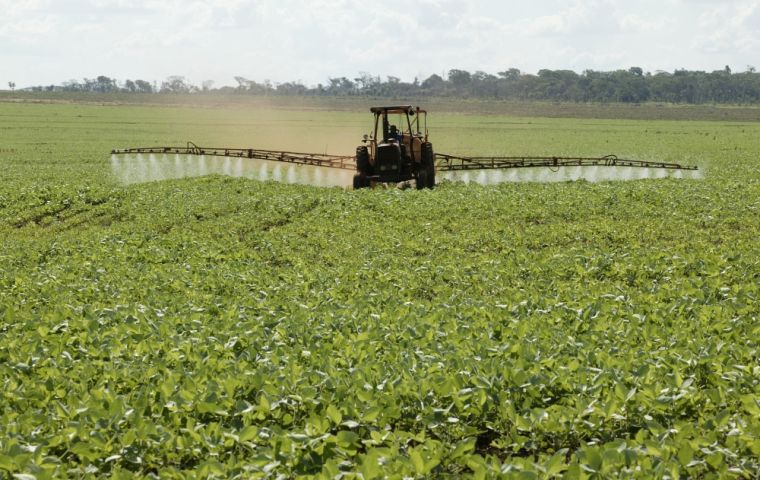MercoPress. South Atlantic News Agency
Paraguay has 180 days to repair environmental damages, says UN
 The Paraguayan Government now needs to find a solution to this environmental and humanitarian issue
The Paraguayan Government now needs to find a solution to this environmental and humanitarian issue The United Nations Human Rights Committee has ruled in Geneva that indigenous people are affected by Paraguayan companies spreading pesticides in areas neighbouring homes, schools, roads and rivers thus affecting the water supply to indigenous peoples, causing “diarrhoea, vomiting, respiratory problems and headaches,” were entitled to reparations.
This “historic” ruling found Paraguay in breach of collective environmental rights as per the Covenant on Civil and Political Rights due to the practices by agricultural companies which “ruin the ecology, poisoning an indigenous population.“ Hence, the government of President Mario Abdo Benítez must remedy this damage in 180 days, according to the document published in Geneva, since such fumigations cause ”diarrhoea, vomiting, respiratory problems and headaches“, including to minors.
This Committee, made up of 18 independent experts elected by the vote of the 173 States that have ratified the aforementioned Pact, of which 116 have also validated its Optional Protocol, which enables individuals to turn to the Committee once it has been exhausted through the internal legal system, has condemned Paraguay, for violating Article 17 of this Pact, causing them to suffer ”arbitrary or illegal interference in their private life, their family, their domicile ...“ in lands that represent their ”home, culture and community,“ threatening ”the cultural survival of the group as a whole.“
According to the UN, the indigenous Paraguayan population ”lives surrounded by large companies that spray pesticides to produce genetically modified soybeans, use agrochemicals that kill animals, affect crops, fruit trees, hunting, fishing and water.“
The Committee warned that the Indigenous Community of Campo Agua 'e, of the Ava Guarani People, pre-existing to the founding of the State, does not allege infringements ”of the right to a healthy environment but of their rights to private and family life, to cultural life and to an effective remedy for breach of the obligation to protect these rights which, in their particular circumstances, entailed the control of respect for environmental standards,” questioning their “notions of domicile and private life.”
So much so that the autochthonous population “lives surrounded by large agricultural companies that spray pesticides to produce genetically modified soybeans, using the use of prohibited agrochemicals, which have killed livestock of the indigenous community, affecting their subsistence crops and fruit trees. and the resources of hunting, fishing, and gathering, and water sources, damaging the health of the people ”, confirmed even by universities in Paraguay and France.
“Serious intangible repercussions” abound, since “the disappearance of natural resources for hunting and fishing, gathering in the forest and Guaraní agroecology caused the loss of traditional knowledge”, such as ”ceremonial practices of baptism (mitakarai),“ by virtue of ”the disappearance of the construction materials of the dance house (jerokyha)“, and by the extinction ”of the corn with which the chicha (kagui) was made“, necessary for ”the ceremony.“
The Committee emphasizes that ”economic activities of the cultural value of an indigenous community“ must be submitted ”to the free, prior and informed consent“ of its members. Specifically, they must ”respect the principle of proportionality, so that they do not endanger the very subsistence of the community“, and must ”ensure the intergenerational transmission of culture“, always ”associated with their ancestral lands and their relationship with nature.“.
Two of the 18 experts, who voted “partially dissenting”, the Committee, in turn, condemned Paraguay's transgression of a second article of the Pact, Article 27, which urges States where “ethnic, religious or linguistic minorities exist”, to not deny “to the people who belong” to such communities “that it corresponds to them, in common with the other members of their group, to have their own cultural life, or to profess and practice their religion and to use their language”.
But the dissent of these two experts, Gentian Zyberi and Phozini Pazartsis was not due to substantive differences, but rather to the fact that the two community leaders who presented the complaint, Benito Oliveira Pereira and Lucio Guillermo Sosa Benega, allegedly did not ”exhaust domestic remedies or for not being sufficiently substantiated ”the communication of the case, submitted to the Committee in 2014, notified to Paraguay in 2015, without the toxic fumigations having ceased.
However, three other experts from the Committee, Hélène Tigroudja, Arif Bulkan and Vasilika Sancin, regretted that Article 6 of the Covenant, which enshrines “the right to life”, a provision that “cannot be interpreted in restricted ways and encompasses the right to enjoy a dignified life ”, being applicable“ even in the absence of death ”.




Top Comments
Disclaimer & comment rulesCommenting for this story is now closed.
If you have a Facebook account, become a fan and comment on our Facebook Page!